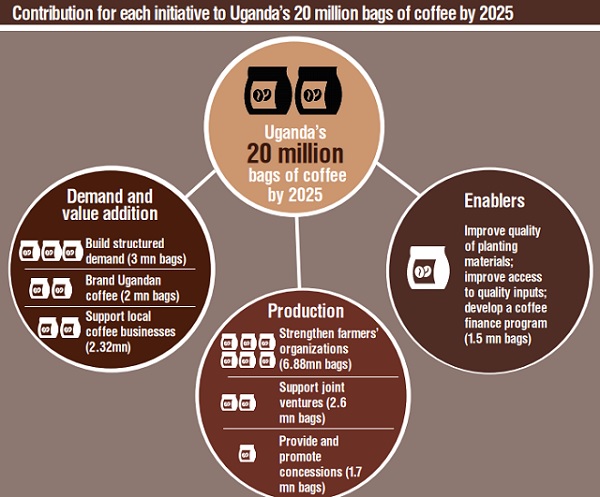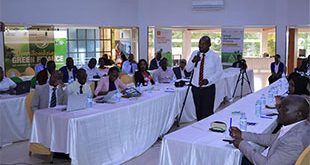Fred Kawuma, the secretary general at Inter-African Coffee Organization (IACO) said there is need to address issues in the value chain to place our coffee successfully in the market.
He said as new investors come to Uganda to join efforts geared towards value addition, raw beans can still be exported along- side small volumes of roasted coffee to keep Uganda’s coffee on the international market.
He said that liberalization of the coffee market particularly in Uganda has seen international coffee players who are primar- ily interested in unprocessed coffee take centre stage in the trade because they sign contracts with roasters in developed countries to supply them with the raw materials.

This, he said, is because local entrepreneurs do not have capacity to process all the coffee being produced and sells it on the global market as a finished product. “That is where key interventions are required,” he said.
This development comes at the time Uganda’s coffee industry is facing a number of challenges related to quality, limited access to credit by farmers and value addition, limited access to land, ageing trees and farmers, price fluctuation, pests and diseases, poor markets as well as negative perception on coffee growing by youth and women.
It also coincides with a number of coffee producing countries including Ethio- pia, Brazil, Honduras, Vietnam, Colombia, Guatemala, Mexico, India, China, laying down strategies to increase coffee production, a move experts say, will continue weighing prices of local coffee exports on the international market amidst low con- sumption locally.
The good thing, is key players like, Ishak Lukenge, the AFCA board chairman, argue that there is a lot of government goodwill to support the coffee sector citing the imple- mentation of the coffee roadmap which is underway.
“We need to develop the culture of consumption in most African countries,” he said during an interview with The Independent. Lukenge said that the Continental Free Trade Area (CFTA) set to be signed in March 2018 by 55 African countries, is good news because it would provide an alternative market for coffee at zero or small tax.
CFTA will become the second largest bloc to the World Trade Organization (WTO) that was signed in 1994. The CFTA will be a market of about 1.3 billion people currently and is expected to be about 2 billion by 2025.
Moses Ali, the first deputy prime minister and deputy leader of government business in Parliament, said the Uganda government is committed to implementing the coffee roadmap through strengthening the policy and regulatory framework focusing on among others, value addition, research in new varieties, pests and diseases control, youth and women engagement and offering seedlings through government programs like Operation Wealth Creation.
Quick facts about coffee
- Coffee is the second most traded commodity in the world
- It contributes 20-30% to Uganda’s foreign exchange earnings
- In 2016/2017 Uganda exported about 4.6 million 60-kg bags of coffee (earned slightly over $500 million) – which was higher than 3.5 million bags that were exported three years ago per year.
- October 2014; President Museveni issued a directive to Prime Minister to accelerate coffee production from 3 million to 20 million bags by 2020-2015.
- December 2015; UCDA and the PM convened a stakeholders’ meeting in which an agenda for a Coffee Lab was agreed upon.
- March 2017: Coffee Lab held culminating into a Coffee Roadmap a transformative agenda for the Coffee Sub sector.
- April 2017: Museveni launched the Coffee Roadmap
 The Independent Uganda: You get the Truth we Pay the Price
The Independent Uganda: You get the Truth we Pay the Price



